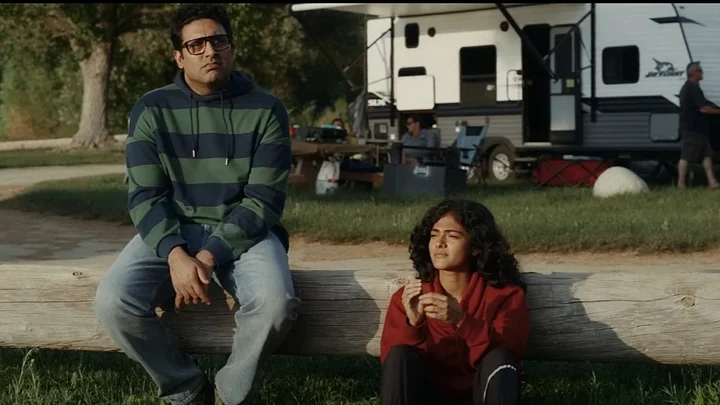Arjun Sen likes to talk and he seems to always have something to say – whether this aspect of his character makes him a better marketing man or whether being in marketing made him the person he is remains unclear. That’s neither a good thing or a bad thing – it just ‘is’. And that is a staple of Shoojit Sircar’s films – the audience connects with them because a lot of his characters just deal with what is doled out to them the best way they know how.
Heroism comes from instinct rather than an impassioned monologue and human connection isn’t as simple as it seems. Piku, definitely some of Sircar’s best work, is a prime example of this. There is no way to value one character over another – there’s no good or bad, they simply ‘are’.
The film opens with Sen striding across his office, emphasising on the importance of a ‘cheese pull’ in a pizza advert. He goes on to explain to his client that he has convinced his daughter that their pizza is healthier than all other pizza. Sen knows that information can be played around with and manipulated (though he would hate the use of the word) but soon, he is faced with news that he can’t weave tales around. A cancer diagnosis is followed by somber news; his doctors give him about 100 days to live.
But Sen is a proud man and this pride morphs into resilience in the face of his diagnosis and when that isn’t enough, he is driven by the need to stick around for his young daughter Reya (played by Pearle Dey and Ahilya Bamroo at different ages). As someone who has spent his life making things marketable to a nameless, faceless audience, he is hellbent on not becoming a statistic.
I Want to Talk has many themes Sircar has shown both an affinity and skill for. There’s a character who is forced to confront his own mortality, there is a father and daughter duo struggling to understand each other, and then there's community found in an unfamiliar situation. Set in Los Angeles, the film hints at Arjun’s loneliness often – he makes friends mostly during his recovery journey; in hospitals and in a handyman that visits his house. Reya, a child shuttling between her father and her mother’s homes, is torn between befriending her father and believing what everyone says about him. Sen is not a likable character from the get-go; one can only imagine the things people say behind his back. But Sircar doesn’t dwell on that, instead focusing on the effect it has on Reya.
Reya goes from being a curious and impressionable child to an outspoken, slightly self-centered teen, and it’s interesting to see the way that shapes her relationship with her father. Both Dey and Bamroo do an impressive job which helps Reya sidestep the corny dialogues she is often burdened with. Abhishek Bachchan as Sen gives one of the best performances of his career – equal parts frustrating and vulnerable.
He surrenders to Sircar’s vision for the character and he surrenders to Arjun Sen’s story – Abhishek Bachchan vanishes from the screen; a feat for any actor. Sen uses his physical transformation to portray the passage of time and Bachchan introduces mild changes to his physical form throughout the film to make the design believable.
The film, however, suffers because of the writing. There is a clear attempt to recreate the charm of Piku, especially with the movie’s attempt at humour. In Piku, writer Juhi Chaturvedi makes the humour seem natural – even the jokes reveal things about the character and the story. Writer Ritesh Shah can’t seem to find that balance – the jokes seem clumsy and sometimes pull you away from the scene. The astute observations into human nature that popular Sircar’s films sometimes miss the mark here.
I Want to Talk, in places, taps into an important conversation – how Reya’s role as a caretaker affects their family and how Sen deals with his growing dependence on the people around him, especially as someone who finds solace in control. But the film spends a majority of the first half following Arjun and his lucky bag from one appointment to another, from one surgery to the next. And while that is definitely an important part of the story – the repetitiveness and the ‘waiting’ – there was enough space to insert more into these quieter moments.
That’s why the film picks up towards the latter half – when we see more of how Arjun interacts with those around him, especially with his surgeon Jayant (Jayant Kripalani). Kripalani plays the role with a mechanical manner that borders on nonchalance but never tips over. As someone who has gone through this routine numerous times over the years, he delivers the worst news like he’s reading out a menu.
I am more than happy that the film doesn’t rely on hammy, sad background music to get its point across but without a strong script in hand, the film does lose some of its emotional depth. At many points in the film I found myself thinking, ‘This scene should have made me tear up,’ but it doesn’t. I Want to Talk, while resting on Bachchan’s able shoulders, simply doesn’t have the words to make Sen’s story shine the way it should.
(At The Quint, we question everything. Play an active role in shaping our journalism by becoming a member today.)
